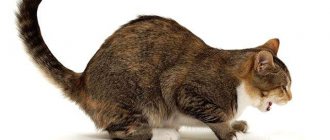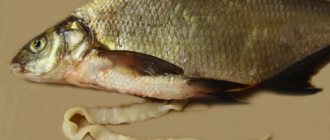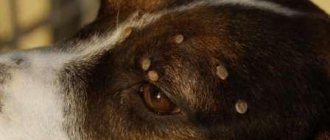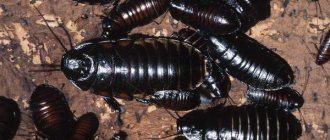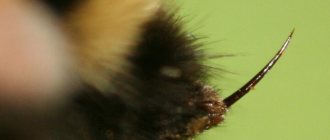How do worms affect a kitten's body?
Worms multiply quickly, affecting the entire body, sucking nutrients from it. Parasites release toxins, poisoning pets that are not yet fully grown. This also happens during the decomposition of dead worms, which are not all excreted in the feces. Intoxication can cause allergies. With a decrease in immunity, the animal becomes easy prey for viruses and infections.
Some worms attach themselves to hollow internal organs. At the same time, they injure the mucous membranes, provoke the appearance of ulcers and tissue necrosis. When there are a lot of worms, the parasites cause obstruction and blockage of the intestines. This often provokes a breakup. The worms multiply quickly, gradually infecting internal organs, which is deadly for the kitten.
Where does a kitten get worms?
Worm larvae and eggs can be found on the ground and grass, so they can easily be brought home on shoes.
Other causes of worm infection in kittens:
- in utero - from a sick mother;
- when a cat licks her offspring;
- upon contact with affected domestic animals;
- eating raw or undercooked fish and meat;
- through intermediate carriers (lice eaters, lice and fleas).
Kittens can pick up parasites if they walk freely on the street or live in a dirty room.
Ways of infecting kittens with worms
Any kitten can become infected with worms, even if it has never left the house. Helminth eggs enter the room along with flies and fleas, and people bring them on clothes and shoes. The body of an adult cat is able to resist their reproduction, while the health of kittens may suffer. Routes of infection:
- An animal ingests helminth eggs when it licks its fur or eats food. Giving him tap water can also cause infection.
- Infection can occur while the kitten is still in the womb. The source will be the mother's body.
- Parasites persist in uncooked meat and fish. If you feed your pet raw foods, infection will occur.
- Ingestion of insect carriers will result in infestation.
- Contact with an infected animal, its saliva, feces, grass, sand and soil leads to infection.
What do worms look like in kittens?
There are three categories of worms: tapeworms, round flukes and flat flukes. They differ in habitats, life cycles, and routes of penetration. Two types of parasites are more common in kittens: tape parasites (cestodes) and round parasites (nematodes).
Cestodes
Cestodes are long tapeworms that live in the intestines and are attached with hooks to the mucous walls. Infection occurs only with larvae; eggs are not dangerous. Worms cause the disease cestodesis. In places where parasites attach, tissue necrosis and ulcers form. In kittens, tapeworms cause various diseases, often dipylidia.
The most common is the cucumber tapeworm. A kitten becomes infected when it swallows an infected insect (usually fleas). Broad tapeworm is rare, as infection occurs through river water and raw fish. But it is not given to kittens, only when the pets accidentally eat it without heat treatment.
Infection with echinococci and alveococci also occurs rarely. Their temporary carriers are rodents and rabbits. But these worms are the most dangerous, since pets become not only intermediate, but also final hosts.
Nematodes
Nematodes are roundworms that most often live in the gastrointestinal tract, but can also be found in other organs. Parasites move throughout the body regardless of the stage of development. They cause diseases that are difficult to treat. Kittens can become infected through their mother's milk by eating the feces of sick animals.
In small pets, parasites provoke the development of anemia, which is dangerous for a fragile organism. There are many types of roundworms, but roundworms and Toxocara are more typical for cats. Hookworms and heartworms can be detected.
Dipylidiasis
Dipilidiosis is caused by cestodes living in the small intestine. Intermediate hosts are lice eaters and fleas. They become infected and swallow parasite eggs. The kitten then eats the insects, biting them out of the fur, and becomes ill. The pet becomes apathetic, exhausted, and his appetite is impaired.
The disease is accompanied by alternating constipation and diarrhea. The animal's fur becomes disheveled and its eyes water. Itching of the anus appears. Trying to get rid of it, the kitten often rubs its butt on rugs and carpeting.
Toxocariasis
Toxocariasis is usually diagnosed at the age of 2-3 months, less often the disease appears after six months. Infection occurs when pets ingest worm eggs in water or food. Then the larva hatches, attaches to the intestinal mucosa, and penetrates the blood vessels. Spreads to the lungs and heart.
The larva begins to develop and migrates to the trachea and bronchi. When coughing it gets into the mouth. The parasites re-enter the intestines after ingestion, and there they become sexually mature. The full development cycle of worms is about a month. Kittens are primarily infected from the milk of an infected mother.
General symptoms
Their severity depends on several factors:
- type of helminth;
- degree of damage;
- individual characteristics of the animal's body.
At the early stage of worm infestation, you may not notice the changes characteristic of this process. Over time, a whole range of symptoms of infection develops, characteristic of all types of worms:
- Changes in the color and consistency of feces. Since many worms adhere to the intestinal walls, damaging it, minor bleeding occurs. This leads to a change in the color of the stool to black or the appearance of streaks of blood. Diarrhea or prolonged constipation is also an alarming sign indicating the presence of a parasite.
- The appearance of the animal’s fur changes, it loses its shine, becomes dull, as if “lifeless.” This occurs due to dehydration and lack of nutrients, because the worm feeds at the expense of its host.
- Pallor of the mucous membrane of the gums and oral cavity, which is a sign of anemia caused by the presence of parasites.
- Loss of appetite – the animal begins to eat less and, as a result, loses weight.
- An increase in the size of the abdomen occurs during massive infection, when there are a lot of helminths. But this symptom also occurs in other diseases.
- Itching of the anus - the cat often licks and scratches it.
- Yellowing of the sclera of the eyes.
- Frequent coughing.
- Change in behavior - the pet becomes lethargic, sleeps a lot and plays little.
- The appearance of vomiting. This is a nonspecific sign that occurs in many other gastrointestinal pathologies, but it is undoubtedly alarming and may indicate the presence of worms in the cat’s body.
All symptoms are nonspecific and may be signs of other conditions and pathologies. If you notice one or more signs of illness in your pet, you should consult your veterinarian as soon as possible.
Symptoms of worm infection
Symptoms of infection depend on the type of worms and their location. Common signs of parasite infection include changes in behavior. Pets become apathetic, lethargic, and nervous. Their appetite decreases, is completely absent, or becomes excessive.
Pain may occur, the intensity of which depends on the degree of helminthic infestation and the number of worms. If the infection is severe, the kitten vomits worms. At the beginning of the invasion, such symptoms are absent. Gradually, the coat becomes dull, becomes scraggly, dermatitis often develops, upset stools, and sudden weight loss are observed.
Signs of helminthic infestation in a kitten, depending on its location:
| Affected organ | Symptoms |
| Intestines and stomach |
|
| Liver and pancreas |
|
| Heart |
|
| Lungs |
|
To the general signs of the presence of worms, specific ones are often added, depending on the location. In kittens, signs appear quickly. Sick pets lag behind in development from other animals. If the helminthic infestation is not treated on time, the infected kittens die.
Symptoms of a kitten with worms
Symptoms of infection of the cat's body with endoparasites directly depend on the location of the helminths. Worms that affect parts of the intestinal tract manifest themselves with a more standard clinical picture, while helminths located in the liver do not show their activity for a long time.
Common signs of the development of helminthiasis in a kitten are:
- a sharp decrease in appetite or refusal to eat;
- weight loss due to lack of appetite;
- developmental problems;
- change in the characteristics of the coat (the coat is dull and actively falling out);
- attacks of nausea and eruption of gastric contents;
- bowel disorders in the form of constipation or diarrhea;
- bloating and increased gas formation;
- accumulation of purulent exudate in the eye area;
- change in behavior - lethargy and apathy;
- the presence of blood in vomit or feces.
The appearance of one of the above-mentioned signs of the presence of helminths in the body of a small kitten is a reason to immediately contact a veterinary clinic for help and treatment.
Qualified assistance is required, because independent prescription and use of antiparasitic drugs is fraught with the development of dangerous complications.
You can speed up the treatment process by providing stool tests during your visit to the veterinarian. In advanced cases of helminthiasis, vomit is taken for analysis, in which eggs or particles of worms can also be detected. For diagnostic purposes, a general blood test is also performed.
Treatment of worms in kittens
Medicines and dosage are selected depending on the degree of infection and the type of worms. This is determined during an examination by a veterinarian and is confirmed by laboratory tests of blood and feces. The drugs are available in two types - external and oral. They are selected according to the age and weight of the kitten. For example, very small children cannot swallow a tablet, then drops and suspensions become the best alternative.
In difficult cases, medications are administered intramuscularly. For little ones, they choose a wide-spectrum action that destroys several varieties of worms at once. There are complex anthelmintics that simultaneously kill external parasites, which can cause the appearance of helminths.
Deworming tablets for kittens
The tablets are given in the morning with food. The dosage is calculated based on the weight of the pet. During primary deworming, the procedure is repeated after 10-14 days. If the helminthic infestation is not severe, then once is enough.
Each deworming drug for kittens has its own advantages and disadvantages:
- "Prasicide +" . It is active against tapeworms, roundworms, flatworms, and mixed infestations. Refers to the means of moderate danger. Incompatible with medications containing pyrantel and praziquantel. Overdose may cause side effects. Kittens are given Prazicide+ only from 3 weeks of age.
- "Drontal" . It contains two active components that destroy most types of worms. Advantage: given to kittens from 2 weeks of age. The tablets are crushed and dissolved in water. Dosage – ¼ per 1 kg of weight. Give in the morning on an empty stomach.
- "Troncil K" . It contains two active substances that help kill round and tapeworms. Kittens are given "Troncil K" from three months. The dosage is similar to Drontal. Another advantage of Troncil K is the absence of side effects.
- "Milbemax" . It is produced in the form of multi-colored tablets. But they can only be given to kittens from six months of age. The medicine contains two active substances that destroy different types of worms and tapeworms. Additionally, Milbemax restores digestion and has almost no side effects. It is very convenient to distinguish the dosage by color. Pink tablets are intended for kittens from 0.5 to 2 kg. Pets less than 500 g are given half.
You can replace the tablets with Polyvercan . It belongs to the broad-spectrum group with two main active components. "Polivercan" is produced in the form of a cube that easily dissolves in water. The advantages of the medicine are that it can be given to your pet from the age of one month.
How to give a kitten a pill for worms
If you feed a whole tablet to a kitten, then the animal is wrapped in a blanket or blanket. Place him on his knees, pressing the pet's back to him. Then they hold it with one hand and open the mouth with the other. Place the tablet closer to the root of the tongue. Close the mouth and hold it there, stroking the throat, causing a swallowing movement. To perform the procedure, it is advisable to have two people, with one holding the pet.
A kitten may choke on a large tablet. Then it is crushed and mixed with a small amount of food (wet food, minced meat). Another way is to crush the tablet, stir it in 1 tbsp. l. water. Wrap the kitten in a blanket. Use a syringe (without a needle) to draw up the solution and pour it into the pet’s mouth – behind the cheek. In this case, the muzzle must be held with the other hand.
Deworming drops for kittens
If the kitten spits out tablets, does not eat food with suspension, powder, or is contraindicated in taking anthelmintics orally, then drops are used. IN-AP is considered one of the best . They treat pets from 2 months. The drug is applied once - at several points from the withers to the middle of the shoulder blades. After treating the kitten for parasites, this area should not be wetted for 48 hours.
Features of other anthelmintic drops for kittens:
- "Profender" . Drops can only be used for kittens from 8 weeks. The dosage is selected by weight. "Profender" destroys worms at different stages of development. It is also used for the prevention of cestodiases and nematodes. It is compatible with any medications except anthelmintics.
- "Stronghold" . These drops are applied to kittens from 6 weeks. For convenience, lilac pipettes are produced. They are for large kittens weighing 2-2.5 kg.
- "Advocate" . The drops are colorless and odorless. Dosage – 0.1 mg/1 kg of weight. The downside is that it is used for kittens from 9 weeks, and the active ingredients only kill roundworms.
Drops are complex products that destroy external and internal parasites. You need to know how to treat a kitten for fleas and worms so that it does not lick the medicine. The solution is applied to the withers - from the point between the ears to the middle of the back.
Worm injections for kittens
If you need to get an injection for worms, it is better to consult a veterinarian. The slightest mistake can lead to the death of your pet. Injections are given in extreme cases, when other methods are impossible or are not suitable for some reason.
The following injections are most often used to worm kittens:
- "Ivomek" . This is a strong drug that acts against all types of helminths and scabies mites. The dosage is calculated based on body weight. Ivomek cannot be used if your pet has an infectious disease. After the injection, you may experience frequent urination and vomiting, but this goes away quickly.
- "Novomek" . The same powerful remedy as Ivomek destroys all types of helminths and scabies mites. The dosage is calculated based on the kitten's weight. Novomek is characterized by high efficiency and low toxicity. It is suitable for treatment and prevention of helminthic infestation.
- "Ivermek" . Destroys internal parasites and helps drive away external ones. After injection, the effect lasts for two weeks, so a single injection of the solution is sufficient. At the same time, medications that support liver function are prescribed. Ivermek is administered to kittens only from 3 months.
The dosage is calculated based on the weight of the animal. When it is necessary to treat a kitten for parasites, the concentration of the drug is reduced by diluting it with saline solution. Injections are given intramuscularly. These are not vaccinations; they are used only to treat helminthic infestations.
Anti-worm suspensions for kittens
The suspension is the best option for deworming a kitten. First, determine the dosage based on the weight of the animal. Then the substance is shaken, drawn up with a syringe (without a needle), and poured into the food or behind the pet’s cheek.
Different deworming suspensions for kittens have pros and cons:
- "Prasicide-plus" . It contains three active components at once. "Prasicide-plus" destroys tapeworms and roundworms at any stage of development. The deworming medicine for kittens tastes good, so they willingly eat it. Prazitsid-plus suspension is given as early as 3 weeks. The medicine is considered the safest. The dosage is calculated by weight - if the kitten is less than 1 kg, give 0.1/100 g. Minus - this suspension cannot be fed to emaciated pets.
- "Dirofen paste" . This is a combined remedy against roundworms, tapeworms, and mixed infestations. It begins to act quickly and is eliminated from the body within 24 hours. Kittens are given deworming medication only at 3 weeks. A single application is sufficient to remove worms.
- "Dironet Junior" . Consists of two active components. Destroys tape and roundworms at any stage of development. Dironet Junior differs from other drugs in the presence of sodium ribonucleate. This component helps to quickly restore mucous membranes damaged by worms and strengthens the immune system. It has a low risk of side effects. Can be given from three weeks. Dosage – 1 ml/1 kg of weight. When the kitten is less than 0.5 kg, the suspension is mixed with boiled water.
Prazitel has proven itself well as the best deworming remedy for kittens. It contains two active components and destroys tape and round parasites. The active ingredients are excreted along with feces and urine within two days. Can be given to kittens from 3 months of age. Dosage by weight – up to 1 kg 0.1 ml/100 g, body weight more – 1 ml/kg. Prazitel should not be given in the presence of infectious diseases or during recovery from them.
Folk remedies for worms in kittens
Folk remedies are non-toxic, they are used as an alternative to synthetic anthelmintics. They are allowed even for weakened kittens. But the duration of treatment is 1 month, minimum – a week.
What is the best anthelmintic for kittens to give from folk recipes:
- Wormwood with tansy . Take 1 tbsp. l. crushed plants, pour a glass of boiling water over them. Leave for an hour, strain, and give to pets in the morning on an empty stomach. They feed only after an hour. Duration of treatment is a week.
- Pumpkin seeds . They destroy all types of worms. The seeds are cleaned, crushed, and filled with warm water. Leave for 12 hours, filter. Add ¼ tsp. honey The mixture is fed to the pet half an hour before meals or enemas are given to it.
- Garlic . For kittens, take ½ clove, chop it, and add it to food. Duration of treatment is a week. When the kitten does not eat such food, an enema is given from a tincture with garlic.
- An infusion of tansy inflorescences with peppermint, wild carrot seeds, wormwood and buckthorn bark . Take 2 tbsp. l. collection of herbs, pour a glass of boiling water. Then they leave for an hour and filter. The kitten is given the product 3 times a day. The duration of treatment is three days.
- Freshly squeezed carrot juice . It is used for enema once a day. Duration of treatment – 1.5 weeks.
- Onion infusion . The small head is cleaned, crushed to a paste, and 250 ml of boiling water is poured in. Then pour 1 tsp into the kitten in the morning, before meals. Duration of treatment is a week.
You can also give your kitten a chamomile decoction for a week. It is poured in 1 tsp. three times a day before meals. Alcohol-based recipes are not used for kittens. Any means are first given in small quantities to see how the pet reacts. Some herbs can cause serious poisoning. Therefore, consultation with a veterinarian is necessary first.
Actions of the owner upon detection of worms
The appearance of characteristic symptoms of helminth infection in a kitten’s body is a reason to visit a veterinarian. The faster the examination and collection of the necessary tests are carried out, the faster the treatment will be carried out.
Independent selection of tablets or special anti-worm suspensions for kittens is not recommended, since it is important to take into account the location of the parasites, their type and the general condition of the animal.
Medicinal antiparasitic agents for adult cats are strongly not recommended for use in small kittens, due to the difficulty of determining the exact dosage of the drug. This will avoid serious poisoning due to antiparasitic drugs. It is important to carefully follow all recommendations from your veterinarian.
Most timely generation anthelmintics are used with meals. The success and speed of treatment for worms depends on several points. By following some recommendations, treatment for endoparasites will be more successful and as comfortable as possible.
At the time of treatment, it is recommended to provide the kitten with a calm, quiet place where the baby can rest. It is also important that the kitten has free access to clean drinking water (preferably pre-boiled). It is recommended to wash the kitten itself before antiparasitic treatment with a special shampoo that destroys ectoparasites.
If the owner of a small kitten seeks help from a veterinarian too late, advanced helminthiasis can lead to serious complications in the body’s functioning, including the death of the kitten.
In the course of their life, helminths literally suck out vitality. In infected kittens, the functioning of the immune system is disrupted in the body, which in turn causes problems throughout the body. In addition, helminths damage the integrity of the intestinal walls, causing small and large hemorrhages, as well as the development of ulcerations.
Dead worms undergo decomposition, causing poisoning of the body with biological decay products. Among the complications of helminth infections that are not treated in a timely manner, there is also blockage of the intestine with balls of worms, and in the absence of qualified assistance, rupture of the intestinal walls with further peritonitis is possible.
Veterinary experts recommend using anthelmintic drugs for kittens in the form of suspensions rather than tablets. If it is not possible to select a suspension, tablet forms of the drugs are used. The correct way to give the tablet so that your pet swallows it is as follows:
The animal is positioned so that it sits with its back to the owner. It is recommended to place the pet on your lap, unclenching the pet's jaw with one hand, and carefully inserting the antiparasitic agent with the other. Next, you need to make stroking movements along the throat, provoking the swallowing reflex.
For ease of administration, the tablet can be pre-ground into powder and mixed with a small amount of liquid. The mixture is filled into a syringe without a needle, carefully pouring small portions into the kitten’s cheek, holding the muzzle. This will allow you to control the process and prevent the animal from spitting out the medicine.
In cases where the animal has a violent disposition and shows aggression during any attempts to give it medicine in a tablet, it is recommended to swaddle the pet, leaving only the head free. The animal is placed and the drug is given in one of the convenient ways.
How to worm a kitten at home
The kitten is dewormed at home using purchased veterinary or folk remedies. In the first case, you can give tablets, drops, suspensions (for example, Prazitel , Prazitsid , Dironet Junior ). More often they are designed for adult animals, so you need to choose the right dosage so that the kitten does not get poisoned. Only a veterinarian can do this.
There are ready-made preparations that are designed for kittens. Then the dosage is indicated in the instructions. Some medications are given for 2-3 days. But this is an additional burden on a fragile body. Therefore, suspensions are more preferable for them.
You can only give your kitten pills if you know the type of parasite. You cannot choose a medicine at random - it can easily cause harm. To destroy helminths, it is fed twice with a break of 10-14 days, for prevention - once. Folk remedies are safer, but they are less effective and will have to be used repeatedly.
Side effects of deworming
Improperly performed deworming can harm the kitten.
Unsuitable anthelmintics can cause side effects in your kitten:
- nausea, vomiting;
- foam at mouth;
- allergic reactions;
- dyspnea;
- problems with breathing and stool;
- sudden weight loss.
The most common adverse reaction is diarrhea. If it lasts no more than 38 hours, this is normal. This is how the pet’s body reacts to the active substances and accelerates the elimination of dead parasites. When side effects appear (nausea, vomiting, itching, muscle spasms, salivation), this indicates intolerance to the components of the composition. Then you need to change the anthelmintic.
In addition to side effects, improper deworming can lead to serious complications - anaphylactic shock, bleeding, sudden changes in pressure, breathing problems, and kidney function.
Can a kitten die from worms?
It is necessary to begin treatment for a kitten as soon as worms are discovered or alarming symptoms appear, then the pet will recover. Dies if therapy is started late, with severe intoxication of the body (especially with weak immunity). Lethal outcome occurs when there is a large accumulation of worms, due to incorrectly selected drugs, due to rupture of a blocked intestine.
If you follow the rules of prevention, the risk of infection with worms is significantly reduced. But if alarming symptoms appear, you need to show your pet to a veterinarian so that he can determine the type of parasites and prescribe medications. Delayed treatment can lead to the death of your pet.
